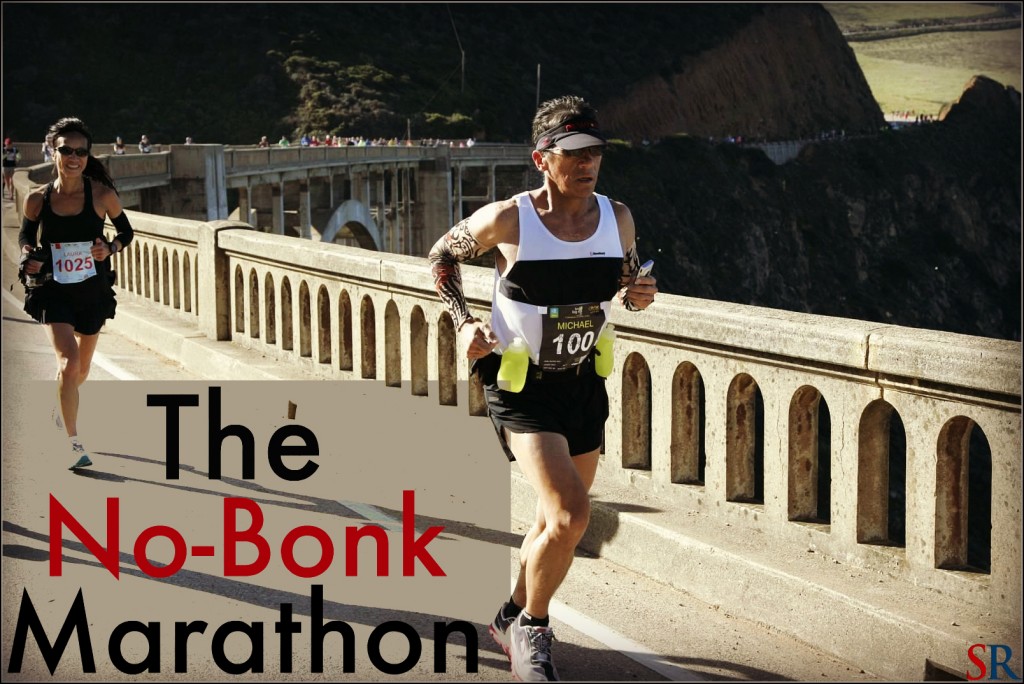Michael is a runner who is willing to tackle monstrous goals.

Not only did he qualify for and run the Boston Marathon last April, he also decided to take on the Boston to Big Sur Challenge. If you’re not familiar with this, it involves running two marathons on two coasts just 6 days apart.
When you set a goal this big, you need to make sure every single piece of the puzzle is in place. Training properly is essential, of course, but so are adequate recovery, sleep and nutrition.
Fueling properly for TWO marathons in six days (on opposite coasts…) presents most of the nutrition challenges you can face condensed into a tiny window. Getting it right in this situation can make or break both your races, so it’s essential to plan accordingly.
As a Run Your BQ member, Michael had an excellent grasp on his training. But with the challenge of Boston to Big Sur looming, he also wanted to get his nutrition and fueling right.
Here’s what happened.
“I couldn’t get over the stress”
Having already experienced the debilitating low that bonking can cause during a marathon, Michael knew he needed to make a change. But he hadn’t yet figured out his marathon fueling.
Michael had followed many nutrition programs in the past, but none had been a good fit. In fact, they left him feeling overwhelmed – even guilty. Guilt and overwhelm are the last things you need during marathon training!
The thought of regular weigh-ins, food calculations, and rigidly adhering to a specific type of diet weren’t ideal for Michael. In fact, they added a huge and unnecessary burden to his training.
I could not get over the feeling of stress every time I stepped on the scale every day, or the guilt I felt when my food score fell short.
Then there was the issue of whether I needed to go vegetarian or vegan. I made a valiant effort, albeit unsuccessfully, and guilt and stress followed.
After using Nutrition for Runners, and was assured that I didn’t have to do all of the aforementioned things to lose weight, those feelings of guilt and stress went away.
I felt like a big weight was lifted from my shoulders.
As a runner training for a marathon (or two, in Michael’s case), there are already a zillion things to think about. Balancing training with family, work, and trying to have some semblance of a social life can be tricky.
Who needs to have food-related guilt added into the equation?
It’s easy to get overwhelmed reading conflicting advice about food and diet fads. Most of us have enough on our plate without worrying about rigid dietary guidelines all day.
But the good news is that fueling as a runner is actually simple. After reviewing the program, Michael decided to invest in Nutrition for Runners:
The reason I purchased Nutrition for Runners was because I was frustrated with bonking during my previous marathons. I trusted that my training program would get me to the finish line; however, I felt that my nutrition plan was keeping me from finishing strongly.
There doesn’t need to be a lot of rules and restrictions. We can show you how to do it all – without any of that guilt.
Putting it all together… without counting a thing
All runners can benefit from one simple recommendation: stop worrying about calories.
Calorie restriction simply doesn’t work when you’re training for a race (and will probably lead to “the bonk” in your next marathon).
And if you have two marathons, 6 days apart? Restricting calories should be the last thing you’re considering.
For any runner looking for a nutrition program to help improve her running, consider:
- Is the program offered by someone qualified? And is it specifically geared toward runners?
- Does your philosophy mesh with program? If you’re a vegan and the program is geared toward a Paleo diet, it won’t be a great fit.
- Can you realistically implement it into your life? While any dietary change takes some adjustments, it’s important to be realistic. If a program isn’t flexible enough to accommodate your needs, you’re not likely to stick with it.
For Michael, experimenting with other nutrition programs helped him understand his fueling needs.
But now, he needed one that fit his own nutrition philosophy and was realistic for his life.
Honestly, what helped me make the decision was my trust in you. I have been a RYBQ member for a couple of years now; and as I noted earlier, I trusted the training.
When you stated in several emails that you were doing lots of research, and that you were partnering with Registered Dietitian Anne Mauney, pulling the trigger was easy.
So what is it about the program that made it such an easy decision for Michael?
The program is practical and answers the most frustrating questions. Do these sound familiar?
- What should I eat before I run a fast workout?
- Do low-carb diets really work for endurance runners?
- Are fasted long runs a good idea?
- Will the carbs I need for the marathon hurt my weight loss goals?
Also, the program follows straightforward principles that anyone can apply, such as eating real foods, learning to compose meals that are both nutritionally complete and satisfying, and adjusting your training to help with weight loss goals.
Not to mention, giving yourself permission to enjoy food, not fight with it!
“Was it hard?”
Michael found it simple to jump into Nutrition for Runners. He no longer felt stressed or overwhelmed by trying to adhere to guidelines that weren’t a good fit.
The feelings of guilt and stress went away and I dove in headfirst without reservation. The transition was easy. The program made sense.
Making easy-to-prepare meals to fuel these workouts shouldn’t be rocket science. A nutrition program that focuses on the right types of food groups rather than counting calories will be the easiest to implement and the most sustainable.
In addition to training and fueling without any added guilt, Michael cited these specific insights that he gained from the program:
- Stop counting calories: This is rule #1! And maybe the only real “rule” in this program.
- Eat intuitively: Eat in a way that makes sense for you and your running. Your nutrition program has to fit your dietary philosophy and needs – and nobody else’s.
- Eat like a runner: The world’s top runners eat a certain way for a reason!
- Train smart: Learn how (and when) to run to maximize weight loss.
- How to fuel for workouts and races: An easy to understand framework for different workout and racing scenarios will help ensure you feel your best every time you run.
Michael’s Double Marathon

After using the Nutrition for Runners program, Michael successfully completed the Boston to Big Sur challenge with no bonking!
He credits his nutrition and fueling as critical to his success:
Without reservation I recommend the program – and already have. The top three positive results are that I maintained my “racing weight,” pushed back the wall during two consecutive marathons, and I accomplished both of these goals without guilt or stress!
When preparing for a race, we spend an enormous amount of time and energy on our training plan.
But how and when we fuel is just as essential. You can improve your nutrition intuitively and guilt free – whether you’re tackling your first 5k or back-to-back marathons.
Michael made some simple changes to his diet and accomplished all of his goals.
If you’d like to improve your fueling and diet, check out Nutrition for Runners.